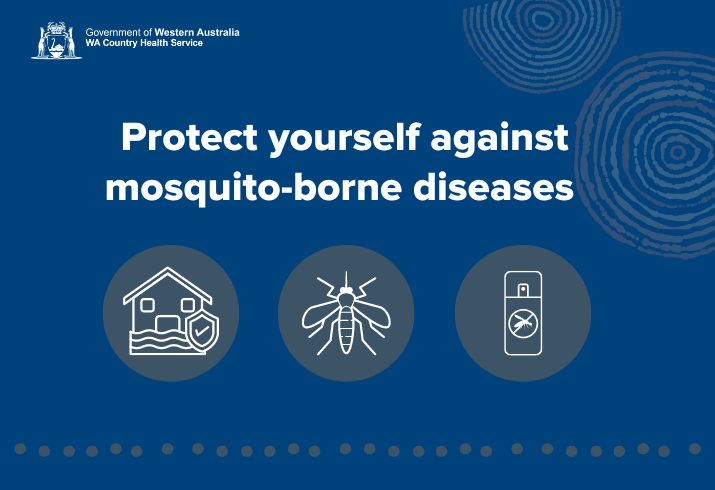Mosquito-borne disease risk in the Goldfields-Esperance and Great Southern regions

WA Country Health Service (WACHS) is urging communities in the Goldfields-Esperance and Great Southern regions to protect themselves against mosquito-borne diseases.
WACHS Public Health Physician Dr Charles Douglas said that, although mosquito-borne disease notifications were currently below average, the number was expected to increase over coming months due to recent rainfall and weather conditions across the region.
“While Ross River virus (RRV) has been active in other regions of WA, we may now expect to see more cases across the Goldfields and Great Southern,” he said.
Symptoms of RRV disease can last for weeks to months and include painful or swollen joints, sore muscles, skin rash, fever, fatigue and headaches.
The only way to diagnose the disease is by visiting your doctor and having a specific blood test.
There is currently no vaccine or specific treatment for RRV disease, the only way to prevent infection is to avoid being bitten by mosquitoes.
“With the peak mosquito season is spring, summer and early autumn, this is a timely reminder to get into good habits now and keep yourself safe,” Dr Douglas said.
To reduce the risk of mosquito-borne infections, the community should:
- avoid outdoor exposure, particularly at dawn and early evening;
- wear protective (long, loose-fitting, light-coloured) clothing when outdoors;
- apply an effective personal repellent containing diethyltoluamide (DEET), picaridin or oil of lemon eucalypt (OLE) evenly to all areas of exposed skin and always follow the label instructions;
- ensure infants and children are adequately protected against mosquito bites, preferably with suitable clothing, bed nets or other forms of insect screening;
- ensure insect screens are in good working order on houses and caravans;
- use mosquito nets and mosquito-proof tents if sleeping outside;
- remove water holding containers from around the home and garden to ensure mosquitoes do not breed in your own backyard; and
- use mosquito coils and mosquito lanterns and apply barrier sprays containing bifenthrin in patio and outdoor areas around houses.
For more information about mosquitoes following cyclones and heavy rainfall visit:
https://ww2.health.wa.gov.au/Articles/J_M/Mosquitoes-and-cyclones

